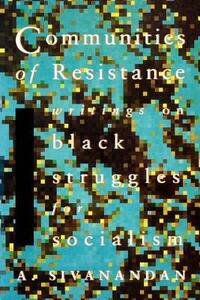You need to sign in or sign up before continuing.
Take a photo of a barcode or cover
1 review for:
Communities of Resistance: Writings on Black Struggles for Socialism
Ambalavaner Sivanandan
1 review for:
Communities of Resistance: Writings on Black Struggles for Socialism
Ambalavaner Sivanandan
As I'm trying to get the annotations from the e-reader onto my laptop, they somehow removed all of them, devastated!
Reading Sivanandan has been a long time coming and I'm glad to say that I have finally read a collection of his essays. One of his more famous essays, 'All that Melts into Air Is Solid:
The Hokum of New Times,' is included. This essay criticises Marxism Today's 'New Times' from 1988 and mainly criticises that and Stuart Hall's contributions. It is definitely one of the strongest essays included and summarises a lot of Sivanandan's points on identity politics and the necessity of class struggle in various movements, something that was fleeting from the rise of New Labour and the 'end of history' from the 90s and onwards. I think one thing I do agree with Hall on was the ways in which consumerism affects everyone, even those who cannot afford it. That feels much more pertinent now, even with Sivanandan's criticisms on those who aren't even in that position.
One thing about this is how British socialists read Sivanandan and don't really seem to grasp what he is saying. It can be a bit off-putting reading about his criticisms of identity politics (especially nowadays when so-called socialists use it to legitimise their own bigotry and chauvinism), however one thing throughout is how much he emphasises the contributions of Afro-Caribbean and Asian women in various community and political struggles in the 70s and 80s, holding out as other forms of black political organising were falling apart. Even without that, he is very explicit in these essays on the vast, rich contributions of social movements alongside class struggle, such as when he mentions Eurocommunism and how: 'The working class, as a consequence, was stripped of its richest political seams – black, feminist, gay, green etc. – and left, in the name of anti-economism, a prey to economism.'
Most of the other essays all share a similar tone on his thoughts on ethnicity, RAT (Racism Awareness Training) and the case study of a white headteacher (Maureen McGoldrick) in a school in Brent and Black Sections in the Labour Party. They're all mentioned in many chapters, with each essay focusing more on one or two of these specifically. It can make some of the essays feel a bit dated or difficult to utilise without a strong awareness on how to apply this to contemporary situations in organising and politics. Some of his other essays, such as 'Racism 1992' are incredibly strong, with the first passage reading like something today: 'There is a new racism emerging from the interstices of the old – less visible, more virulent, open to fascism and European – a racism directed against the migrants, refugees and asylum-seekers displaced from their own countries by the depredations of international capital.'
The final chapter on Sri Lanka can feel a bit too distinct from the rest of the book, still it's a strong chapter with a lot on information on the situations there at the time of writing. It helps to situate how Sivanandan's thoughts on identity politics would emerge from his life there to being a librarian at the Institute of Race Relations to eventually taking over and establishing the journal Race and Class (where many of these essays were first published)
His understandings on anti-imperialism, the situations in the Third World and the rising changes to production that we see now and the resulting reactions against migrants, asylum seekers and the many in Britain who work in precarious jobs are very strong and are definitely the parts of his work that hold up the most and are the most important to consider.
Overall, all British Marxists should read Sivanandan.
Reading Sivanandan has been a long time coming and I'm glad to say that I have finally read a collection of his essays. One of his more famous essays, 'All that Melts into Air Is Solid:
The Hokum of New Times,' is included. This essay criticises Marxism Today's 'New Times' from 1988 and mainly criticises that and Stuart Hall's contributions. It is definitely one of the strongest essays included and summarises a lot of Sivanandan's points on identity politics and the necessity of class struggle in various movements, something that was fleeting from the rise of New Labour and the 'end of history' from the 90s and onwards. I think one thing I do agree with Hall on was the ways in which consumerism affects everyone, even those who cannot afford it. That feels much more pertinent now, even with Sivanandan's criticisms on those who aren't even in that position.
One thing about this is how British socialists read Sivanandan and don't really seem to grasp what he is saying. It can be a bit off-putting reading about his criticisms of identity politics (especially nowadays when so-called socialists use it to legitimise their own bigotry and chauvinism), however one thing throughout is how much he emphasises the contributions of Afro-Caribbean and Asian women in various community and political struggles in the 70s and 80s, holding out as other forms of black political organising were falling apart. Even without that, he is very explicit in these essays on the vast, rich contributions of social movements alongside class struggle, such as when he mentions Eurocommunism and how: 'The working class, as a consequence, was stripped of its richest political seams – black, feminist, gay, green etc. – and left, in the name of anti-economism, a prey to economism.'
Most of the other essays all share a similar tone on his thoughts on ethnicity, RAT (Racism Awareness Training) and the case study of a white headteacher (Maureen McGoldrick) in a school in Brent and Black Sections in the Labour Party. They're all mentioned in many chapters, with each essay focusing more on one or two of these specifically. It can make some of the essays feel a bit dated or difficult to utilise without a strong awareness on how to apply this to contemporary situations in organising and politics. Some of his other essays, such as 'Racism 1992' are incredibly strong, with the first passage reading like something today: 'There is a new racism emerging from the interstices of the old – less visible, more virulent, open to fascism and European – a racism directed against the migrants, refugees and asylum-seekers displaced from their own countries by the depredations of international capital.'
The final chapter on Sri Lanka can feel a bit too distinct from the rest of the book, still it's a strong chapter with a lot on information on the situations there at the time of writing. It helps to situate how Sivanandan's thoughts on identity politics would emerge from his life there to being a librarian at the Institute of Race Relations to eventually taking over and establishing the journal Race and Class (where many of these essays were first published)
His understandings on anti-imperialism, the situations in the Third World and the rising changes to production that we see now and the resulting reactions against migrants, asylum seekers and the many in Britain who work in precarious jobs are very strong and are definitely the parts of his work that hold up the most and are the most important to consider.
Overall, all British Marxists should read Sivanandan.

